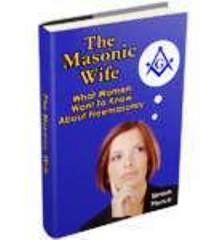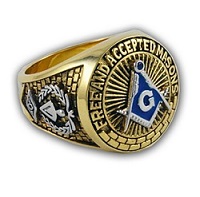Apprentice Training Masonic
Masonic Entered Apprentice Training
Just Got Easier!
 Masonic Education Officer
Masonic Education Officer
Apprentice Training Masonic initiates is performed by the lodge education officer.
This page is written to help the Masonic Education Officer with their duties.
If you are a newly Entered Apprentice, please begin your studies by reading the Entered Apprentice Mason page.
Apprentice training Masonic initiates is one of the most talked about and seldom well-accomplished duties within many Lodges.
The most dutiful of Worshipful Masters and Education Officers make valiant attempts to provide meaningful, in-depth material to our new members, but there are so many facets to Masonry that it can truly be difficult, if not nearly impossible, to relay all this information in a step-by-step, single-file manner to a new brother who is in Apprentice Training.
Masonic ritual work is almost easy, in comparison, because the member hears and watches it performed repetitively, and after several months, sometimes without even realizing it, the words begin springing forth from their subconscious.
Many Master Masons who have attended lodge for a few months, listened to ritual and spent 20-30 hours studying their cipher book, amaze even themselves when the fateful evening arrives when an officer is absent and they are asked to perform that officer's ritual duties.
That said, 1, 2, 3 or even 10 years later, they still may
not know what the Masonic Sheaf of Corn hanging from the ceiling, (which they
have passed under for years), represents to Freemasons or why.)
Masonic initiates who are in apprentice training learn about Freemasonry from their lodge's Masonic education officer and from their own personal studying.
The issue of Apprentice Training Masonic Initiates was probably best said by
Carl H. Claudy, more than 50 years ago.
(Carl H. Claudy (1879-1957) Grand Master of Masons in the District of
Columbia, 1943 ) in his excellent 64 page book, "Introduction to Freemasonry -
Entered Apprentice", originally copyrighted in 1931.
"Many lodges attempt to intrigue the new brother with books. Some
books are forbiddingly large; others are too learned; others assume that the
reader has a knowledge which he does not possess.
Some books are dull with
many facts and no vision, while others are too specialized or confined to one viewpoint."
Each new brother learns at his own speed.
Much like the building of King Solomon's Temple, it is imperative that
Masonic education be imparted in slow, even and measured doses, wherein a strong
foundation is laid...upon which the perfect ashlars are expertly placed
using the Master's Mason's trowel of brotherly love.
Masonic education builds Masonic retention. One of the initiates you
train, today, may become the Worshipful Master or possibly the Grand Master of
tomorrow. He may even become the Education Officer who will train your son
or grandson.
Apprentice training Masonic new brothers in slow and
measured doses, at a rate which each new brother can learn is best performed in
the following manner:
1 Hour class on the same night but on the off-week
between your regular Masonic lodge meetings.
Why 1 hour?
1. As Lodge Education Officer, this begins the slow and
measured dosage of knowledge.
2. This is a short do-able length of time...and a Get-Miles-
Get Home approach that benefits everyone involved.
3. Longer meetings may not be as well attended.
Why hold Apprentice Training Masonic Education on the
same night but on the off-week between regular meetings?
If your regular meetings are held on the 2nd and 4th Tuesday of the month,
hold your Apprentice training Masonic education meeting on the 1st and 3rd
Tuesday of the month:
Why? While you may hold your meetings any time you like, (and these
are only guidelines), by holding your education meetings on the same night of
the off-week:
1. It makes it easier for the member to
remember which day
of the week the education meeting will always be held.
2. It makes it easier for the member's family to remember
that the member is at lodge each and every Tuesday
evening,
so they can adjust their schedules, accordingly,
beforehand.
3. It gives the Education Officer 2 weeks to prepare material
between each meeting.
4. The lodge Education Officer doesn't have to prepare as
many materials, making his job easier.
5. The Apprentice training Masonic member doesn't have to
attempt to learn as much all in one sitting.
By simply holding (2) - 1 hour Apprentice training Masonic education
meetings a month, it keeps everyone's time constraints to a minimum and
encourages a higher number of participants.
What is the best time to hold Apprentice training
Masonic education meetings?
This depends on your audience.
If many of them work at jobs where they get dirty or sweaty, or do not get off
work until after 5:00, they would probably prefer to get off work, go home,
clean up, eat some dinner and then come to the Apprentice training Masonic
education meeting from 7:00 p.m. to 8:00 p.m.
If the majority of them work at jobs where they do not get dirty, sweaty and get
off promptly at 5:00, they would probably prefer to have something to eat, and
then attend the Apprentice training Masonic education meeting from 6:00 p.m. to
7:00 p.m.
If you have several members who must get up very early, an 8:00 p.m. to 9:00
p.m. meeting may not be very well attended.
You are the one who bests knows your audience. Determine which time is
best by asking them.
If you, arbitrarily set a time without asking them if
they are able to attend, your participation may be greatly diminished.
Apprentice Training
Masonic Initiates
1. Punctuality:
It is important to begin your Apprentice training at
exactly the time you have previously set and it is even more important
to end your Apprentice training Masonic initiate education at
exactly the time you previously determined.
Always begin each
meeting by telling the initiates that the meeting ends promptly at
_______O'clock.
2. Newsletter Notification:
Place the ongoing dates and times of your Apprentice
Training in your newsletter. You may spark the interest of
members who have not attended lodge in a long time.
3. Invite members from other lodges.
This increases everyone's social network of knowledgeable
Freemason brothers, as well as may boost your Masonic
education meeting attendance rolls.
As Education Officer, where should I begin?
The list below is an excellent beginning. If you perform your
Apprentice training Masonic education on each off-week, as required, you may
wish to choose from some of the items below,
First, ask each of them to bring an empty 1" or 1-1/2" (3-ring) notebook
to each Apprentice training Masonic education meeting. Explain to them
that they will need it to place their papers into and to use as their ongoing
study and reference guide.
Apprentice Training Masonic Education
Meeting # 1
Masonic Blue Lodge Etiquette
Print as many copies of the
Masonic Etiquette page, as you will have attendees, plus one for yourself.
Read each of its items to your audience and then ask for questions after each
item.
Note: Do not give them their copy of the Masonic Blue Lodge Etiquette until after the meeting is over, because if they begin reading it on their own, they will not be listening to you and may miss the Q & A discussion, completely.
The Q & A (Question and Answer) discussion will help
break the ice so everyone relaxes and learns at their own pace. After each
item has been discussed and Q & A is over, then hand them their copy and ask
them to place it into their Blue Lodge notebook.
Apprentice Training Masonic Education Meeting
# 2
Lodge-Walk:
Ask everyone to meet in front of the entrance door to the Lodge Room.
Begin by explaining:
A. The Tiler's Duties For the answers, click on the Lodge Officer Duties link at the bottom of this page.
Why does he stand at the door?
Why is it his duty to carry the Tiler's Sword?
Enter the Lodge Room. Begin discussing each and every Masonic Lodge furnishing, its use, its meaning and the history behind it.
(If you, the Education Officer, are uncomfortable or do not know a lot about each lodge furnishing, ask a knowledgeable brother to attend and assist you with your presentation during this part of the Apprentice training Masonic education Lodge-Walk)
B. Discuss the 4 Officer chairs
Who sits in the East? (the Worshipful
Master)
Why?
How
many steps are in front of his chair? (3)
Why?
Who sits in the West? (Senior Warden)
Why?
How many
steps are in front of his chair? (2)
Why?
Who sits in the South? (Junior Warden)
Why?
How many
steps are in front of his chair? (1)
Why?
Who sits in the North? (symbolically, the
Supreme Architect of the Universe)
C. Officer Duties
What are each officer's duties?
(See
Lodge Officer Duties
)
D. The Letter "G"
Why is the
Letter "G"
hanging on the ceiling?
What is its two-fold meaning?
E. Boaz and Jachin
What do the pillars on
each side of the door to King Solomon's Temple, represent?)
F. Sheaf of Corn
Why is there a
Sheaf of Corn (or grain) hanging from the ceiling?
What does it represent? (the plenty)
G. 3 Great Lights
What are they? Why are they important
to Freemasonry?
H. Altar and the Holy Book(s)
Why is there an Altar in the center of the
lodge room?
Is
it any different than other altars? Why is there one or
more
Holy Scriptures upon the Altar? When are they
opened?
By whom? When are they closed? By
whom?
Explain why Masonry is non-sectarian and therefore,
while in
the United States, the Holy Bible is the most
utilized, Holy Books
of other faiths may be placed side-
by-side upon the altar such as the
Torah, the
the Veda, (the sacred scripture of
Hinduism), etc.
I. 3 Lesser Lights
What are they? Where are they placed?
What do they represent?
J. Master's Gavel
What does the Master's
gavel represent? Explain the
number
of raps and what each of them mean.
K. Funeral Aprons
Show them the funeral aprons and discuss
briefly what a
Masonic funeral entails and why once they become a
Master Mason, it is their right to request one.
L. Lodge Charter
Show them the Lodge Charter. Explain its
significance.
When is it draped? Why is it draped?
M. Lodge Library
Show them the Lodge Library (if you have one)
and
encourage the initiate to check out its books for further
Masonic study.
If your Lodge Room has pictures of Past Masters, Masonic Presidents or
others, point them out and explain why they hang in your Lodge Room.
If your Lodge Room has other Masonic paraphernalia (awards,
plaques, trophies, etc.) explain the meaning behind them.
Apprentice Training Masonic Education Meeting
# 3:
History of Freemasonry
Tell your students about:
King Solomon's Temple in the Holy
Scriptures
and why Freemasons
use this biblical symbolism, today.
Why
Freemason symbols
were used
during the Middle Ages (because most people of the day were illiterate).
When was the first Grand Lodge in England formed? On June 24, 1717, which is St. John the Baptist's Day, 4 London lodges came together at the Goose and Gridiron Ale House in St. Paul's churchyard and formed what they called The Grand Lodge of England.
When did Freemasonry come to the United
States? In 1733, Henry Price, the Provincial Grand Master over all
of North America for the London Grand Lodge, granted a charter to
a group of Boston Freemasons. This lodge was later named St. John's
Lodge and was the first duly constituted lodge in America.
The difference between operative Freemasonry and speculative Freemasonry.
Freemason Symbols: Begin explaining each of the various Masonic symbols and their significance.
If explained properly, Masonic Symbols, alone, could carry you through an entire
year of Masonic Education, however in the United States, the Entered Apprentice
may very well have received his Fellow Craft degree by the time these 3
Apprentice Training Masonic education meetings are completed!
Masonic Education Builds Masonic Retention
Related Pages:
5 Fast Methods To Find the Information You Want to Learn About
- Search Box - Use the Search Box at the top of your page.
- Site Map - Use my Site Map page to find the topics you are most interested in.
- Carousel - Use the carousel of pages at the top of your screen.
- Menu Icon - On MOBILE, click the MENU button at the top of each page.
- Masonic Books - Browse through a selection of Masonic books.






